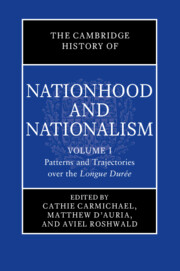Book contents
- The Cambridge History of Nationhood and Nationalism
- The Cambridge History of Nationhood and Nationalism
- The Cambridge History of Nationhood and Nationalism
- Copyright page
- Contents
- Figures
- Contributors
- General Introduction
- Part i The Politics of Ethnicity, Nationhood, and Belonging in the Settings of Classical Civilizations
- Part ii Paradigm Shifts and Turning Points in the Era of Globalization, 1500 to the Present
- 7 Colonial Expansion and the Making of Nations: The Spanish Case
- 8 The Reformation and National Identity
- 9 Europe’s Eighteenth Century and the Quest for the Nation’s Origins
- 10 Empire, War, and Racial Hierarchy in the Making of the Atlantic Revolutionary Nations
- 11 The Rise of the Charismatic Nation: Romantic and Risorgimento Nationalism, Europe, 1800–1914
- 12 Revolution and Independence in Spanish America
- 13 A Tale of Two Cities: The American Civil War
- 14 The Cycle of Inevitability in Imperial and Republican Identities in China
- 15 Colonial Subjects and the Struggle for Self-Determination, 1880–1918
- 16 The First World War
- 17 Anticolonialism and Nationalism in the French Empire
- 18 Patriotism in the Second World War: Comparative Perspectives on Countries under Axis Occupation
- 19 Decolonization and the Cold War
- 20 1968: The Death of Nationalism?
- Conclusion to Part II
- Index
- References
9 - Europe’s Eighteenth Century and the Quest for the Nation’s Origins
from Part ii - Paradigm Shifts and Turning Points in the Era of Globalization, 1500 to the Present
Published online by Cambridge University Press: 27 October 2023
- The Cambridge History of Nationhood and Nationalism
- The Cambridge History of Nationhood and Nationalism
- The Cambridge History of Nationhood and Nationalism
- Copyright page
- Contents
- Figures
- Contributors
- General Introduction
- Part i The Politics of Ethnicity, Nationhood, and Belonging in the Settings of Classical Civilizations
- Part ii Paradigm Shifts and Turning Points in the Era of Globalization, 1500 to the Present
- 7 Colonial Expansion and the Making of Nations: The Spanish Case
- 8 The Reformation and National Identity
- 9 Europe’s Eighteenth Century and the Quest for the Nation’s Origins
- 10 Empire, War, and Racial Hierarchy in the Making of the Atlantic Revolutionary Nations
- 11 The Rise of the Charismatic Nation: Romantic and Risorgimento Nationalism, Europe, 1800–1914
- 12 Revolution and Independence in Spanish America
- 13 A Tale of Two Cities: The American Civil War
- 14 The Cycle of Inevitability in Imperial and Republican Identities in China
- 15 Colonial Subjects and the Struggle for Self-Determination, 1880–1918
- 16 The First World War
- 17 Anticolonialism and Nationalism in the French Empire
- 18 Patriotism in the Second World War: Comparative Perspectives on Countries under Axis Occupation
- 19 Decolonization and the Cold War
- 20 1968: The Death of Nationalism?
- Conclusion to Part II
- Index
- References
Summary
Some years ago, the intellectual historian Bronisław Baczko noted that a crucial feature of eighteenth-century thought was its all-pervasive desire for a “return to origins,” a fixation emerging through a quasi-obsessive quest for the beginning of all sorts of social, political, and religious institutions as well as moral principles.1 Indeed, Jean-Jacques Rousseau’s Discours sur l’origine de l’inégalité (1754), Edmund Burke’s Philosophical Enquiry into the Origin of our Ideas of the Sublime and Beautiful (1757), Johann Gottfried Herder’s Abhandlung über den Ursprung der Sprache (1772), and the Essai sur l’origine des connaissance humaines (1778), by the abbé de Condillac, are just a few works that testify, by their titles alone, to the eighteenth-century preoccupation with “origins.” But many more could be added. From the late seventeenth century onwards, innumerable scholars across Europe produced a plethora of tracts, pamphlets, articles, and books to investigate and dissect the origins of languages, knowledge, feelings, prejudice, and, importantly for us, nations.
- Type
- Chapter
- Information
- The Cambridge History of Nationhood and Nationalism , pp. 186 - 207Publisher: Cambridge University PressPrint publication year: 2023

